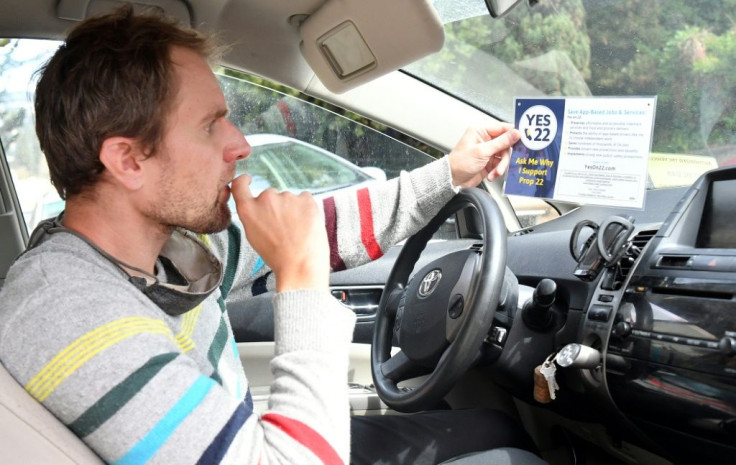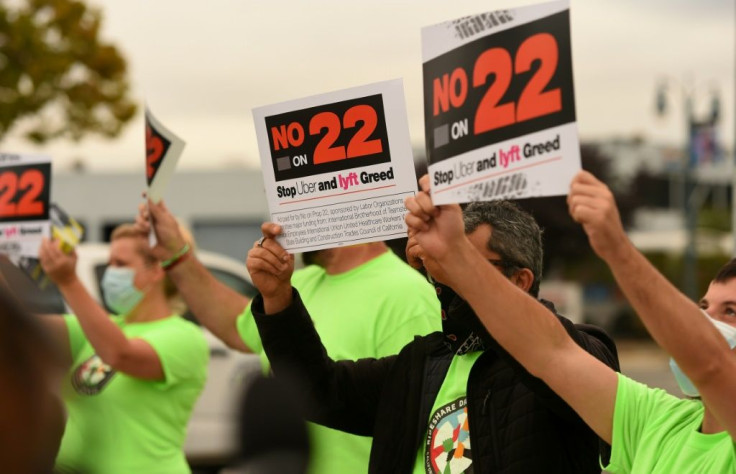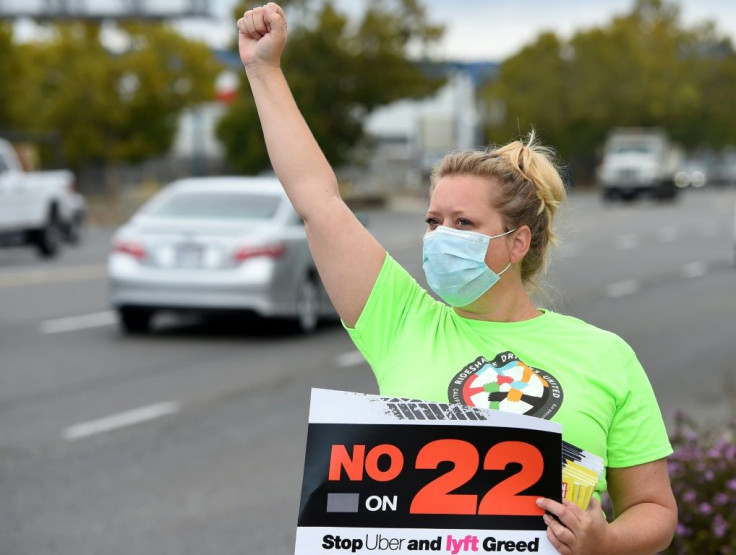Contractors Or Employees? Uber Drivers Split Ahead Of California Vote
Ahead of a referendum that could upend the whole gig economy, Uber driver Karim Benkanoun says his relationship with the rideshare giant must stop being a one-way street.
"If you're a driver with Uber or Lyft, you're nothing," said Benkanoun as he speaks of how he will vote in California's Proposition 22 referendum.
"They don't consider us as employees, they consider us as independent contractors but we have no say in the contract.
"It doesn't work this way and it has to change."
Proposition 22, which is being put to voters on the same day as the November 3 presidential election, will determine whether California's government can enforce a law which became effective this year requiring on-demand companies to treat drivers as employees, instead of independent contractors.

Were the referendum to be approved, drivers would remain independent contractors but Uber and Lyft would pay them a number of benefits promised as part of a compromise package, including a minimum wage, a contribution to health care and other forms of insurance.
If it doesn't pass, the drivers would be classified as employees and thus entitled to all the benefits laid out in California labor law.
Supporters in the "Yes" camp are warning of mass job losses if they lose as the companies could not afford to keep on all their drivers and say others will quit because they will automatically have less flexibility.
While supporters argue the bill would mean increasingly hard-pressed drivers are guaranteed to earn between $25 and $28 per hour, critics cite a University of California study showing that compensation equates to only $5.64 per hour after subtracting unreimbursed costs, taxes and waiting time.
The measure has divided drivers, some of whom want the benefits of regular employment while others such as Sergei Fyodorov enjoy the flexibility of being able to work on weekends or whenever he chooses to pick up extra income.

"If you make a living out of it, great, but for me it's supplemental income and flexibility," said Fyodorov, who has a regular job as a project manager at a tech company.
"Let's say Proposition 22 does not happen. I can guarantee that Lyft, Uber and all these services will lay off at least 80 or 70 percent of the drivers and the main thing is that we're not going to get the flexibility."
Geoff Vetter, a spokesman for the "Yes" campaign, said hundreds of thousands of jobs would be lost across a global industry headquartered in California, arguing many drivers would quit if they have to work set hours.
"With Proposition 22, we're trying to recognize first that these drivers want to remain independent contractors -- more than 70 percent of drivers say they want to remain independent contractors because it gives them flexibility and choice -- while also getting new benefits like a minimum guarantee (for wages) and health care," said Vetter.
Benkanoun, who began working with Uber in 2012, says he used to make between $1,500 and $2,000 a week but is now lucky to make $500 before expenses despite working a seven-day week with demand shrunk by the Covid-19 pandemic.

As his income has dwindled, so has his faith in the rideshare companies. "I don't trust anything Uber or Lyft says," he said.
Another driver, Erica Mighetto of Sacramento, said she was making $40 an hour when she started driving four years ago but only $20 earlier this year and now that's closer to $10 an hour in pandemic conditions.
"Uber and Lyft are just trying to exempt themselves from the benefits that drivers need," said Mighetto, who drove from her home in Sacramento to take part in a recent demonstration calling for a "No" vote. She slept in her car.
"We need a guaranteed minimum wage and overtime and in this time we desperately need employment for drivers who are unable to work and support their families."
Uber and Lyft have said they may need to terminate service in the state if their business model is upended.
Lyft said its survey of drivers showed 86 percent worked fewer than 20 hours per week and most preferred to keep the flexible contractor model; Uber has also said the majority of its drivers want to keep their situation.
"While these services feel ubiquitous to our lives, they're very new," Vetter told AFP.
"I think there's recognition we need to apply a 21st century solution to 21st century challenges."
But drivers like Mighetto are not convinced.
"They're really trying to scare drivers and scare voters into doing what they want," she said. "I think that billionaire companies are able to offer flexibility as well as minimum protection."
juj-rl-co/dw
© Copyright AFP 2024. All rights reserved.





















